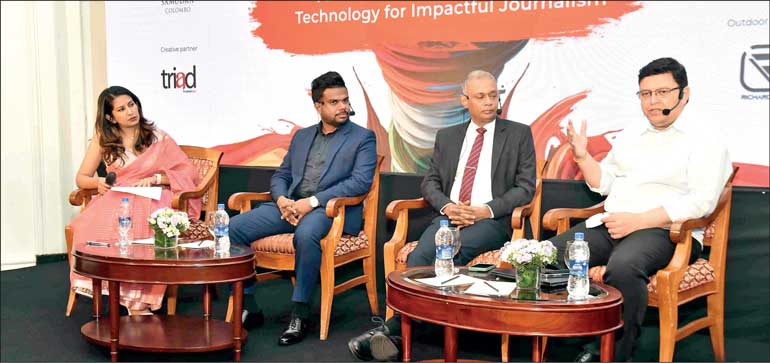Monday Feb 16, 2026
Monday Feb 16, 2026
Wednesday, 30 April 2025 00:00 - - {{hitsCtrl.values.hits}}

From left: Moderator Newswire Editor Kalani Kumarasinghe, Journalist/TV Derana Manager – Current Affairs Kalindu Karunaratne, Dialog Axiata Group Chief Analytics and AI Officer Dr. Romesh Ranawana, and India Today Group Chief Synergy Officer Shailesh Shekhar
– Pic by Upul Abayasekara
By Janani Kandaramage
As technology rapidly alters the fabric of the media landscape, the opportunities, threats, and ethical concerns surrounding its integration into journalism came under intense scrutiny during last week’s panel discussion.
In Sri Lanka’s first-ever Media Festival 2025 hosted by the Sri Lanka-India Media Friendship Association (SLIMFA), India Today Chief Synergy Officer Shailesh Shekhar touched on the evolving role of Artificial Intelligence (AI) in journalism, with a focus on how journalists, particularly in India, are integrating AI into their workflow.
He emphasised that AI should be viewed as an ally that augments journalistic work rather than replacing it, stating: “AI doesn’t replace the judgment or creativity of journalists. Rather, it aids in tasks like gathering information and automating repetitive processes, ultimately enabling journalists to focus on crafting stories rather than getting bogged down by routine operations.”
Adding to AI’s role as an ally to human capabilities, he pointed to the launch of India’s first AI-powered news anchor two years ago as a significant milestone in the integration of AI into journalism. Although the anchor’s abilities were confined to predefined tasks, its presence afforded journalists more time to focus on refining the editorial process.
Affirming Shekhar’s faith in human-tech collaboration, journalist and TV Derana Current Affairs Manager Kalindu Karunaratne noted that Sri Lanka’s newsrooms are still in the early stages of adopting technologies, although some media outlets have started experimenting with AI for basic tasks such as transcription and content summarisation. However, it became clear that these tools are still in their infancy, and a more systematic approach is necessary to fully embed this phenomenon into the media industry.
Karunaratne stressed the need for a comprehensive strategy for AI adoption, calling for a robust framework outlining clear guidelines and specialised training programs that ensure emerging technologies are utilised responsibly and effectively. “Without this, there are concerns that AI could be misused, leading to ethical dilemmas or inconsistent journalism standards,” he opined.
In response to concerns raised over potential misinformation and diminished quality as a result of reliance on online software, Dialog Axiata Group Chief Analytics and AI Officer Dr. Romesh Ranawana said tailored AI tools that align with the specific needs and nuances of the local industry must be developed. This involves creating AI systems that are sensitive to Sri Lanka’s linguistic diversity, cultural contexts, and journalistic integrity, assuring that by “customising AI applications to reflect the country’s unique media environment, news organisations can leverage technology to improve efficiency and accuracy while upholding ethical practices.”
He believes that if the adoption of AI enhances under a structured approach taken by media companies, the credibility of news reporting will not be undermined.
Other concerns emboldened included ensuring that technology complements and not replaces the human elements of journalism. While acknowledging that it can lead to homogenised reporting, loss of investigative depth, and novelty, Dr. Ranawana urged that digital advancements must be integrated with caution, positioned as a tool to support journalists without eroding the core values of independent, thoughtful, and human interest reporting.
There was, however, general consensus that Sri Lankan newsrooms could benefit from transparency about AI-generated content, erasing taboos surrounding the use of AI as a source of inspiration for story development. “Embracing AI can provide journalists with fresh perspectives, data-driven insights, and innovative approaches to reporting,” observed Karunaratne.
Sri Lanka’s journey towards AI integration does not have to be done in isolation. The three panellists agreed on the importance of learning from neighbouring countries in Southeast Asia that have already made strides in AI adoption.
“For example, the JournalismAI Academy, a program supported by the Google News Initiative, has helped small newsrooms in Southeast Asia embrace AI effectively by participating in such programs,” Shekhar remarked, adding that, “Sri Lankan journalists could gain valuable insights and practical tools to help them integrate AI in ways that are both responsible and impactful. This collaboration with regional counterparts would provide Sri Lankan media professionals with the necessary resources to navigate the changing digital media landscape.”
The Media Fest’s Platinum Sponsor was UltraTech Cement, and Gold Sponsors Lanka IOC PLC and India External Affairs Ministry’s Economic Diplomacy Division. SriLankan Airlines was the Official Travel Partner and Taj Samudra the Hospitality Partner, Outdoor Partner Richardson, and Creative Partner Triad. Gift partners were Spa Ceylon and Dilmah Tea.